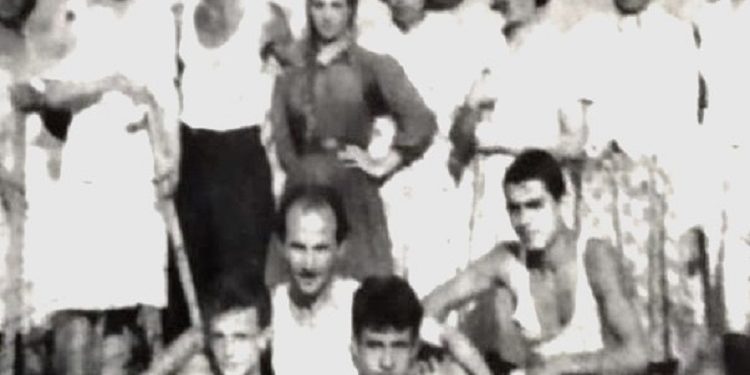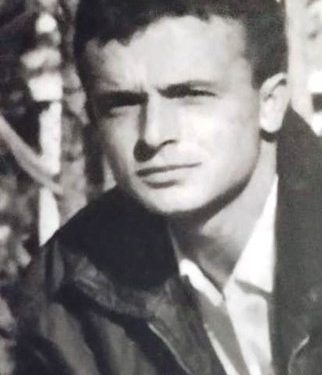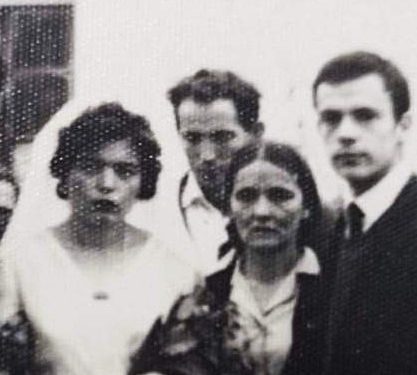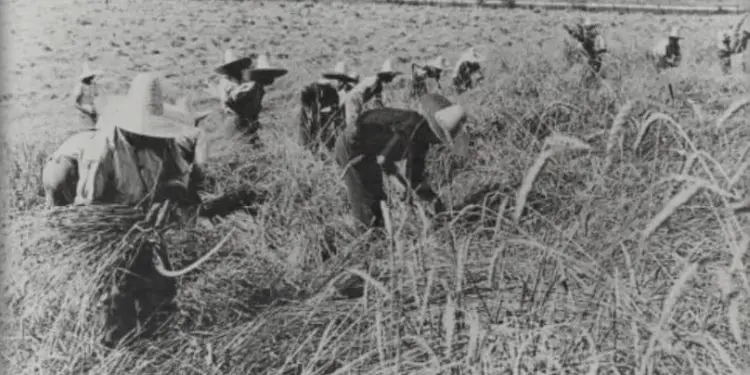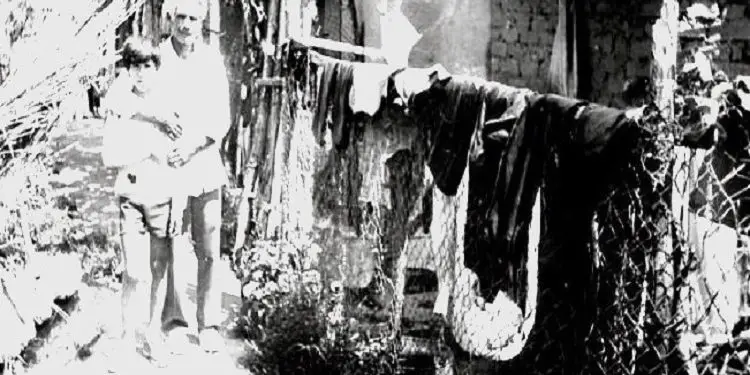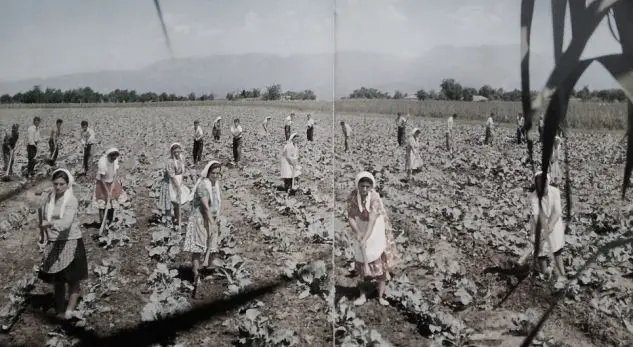By SIMON MIRAKAJ
The seventh part
Camps under the shadow of Tomorr, 44 years of internment’
Memoir
Memorie.al / I put these memories on paper, after a long period of hesitation. This is probably because the subjects were always fresh in my mind, which followed me mercilessly during the years after the fall of communism. But there comes a moment – when time takes its course – and the images of horror and suffering came fading to me – almost the suffering passed into oblivion. Then I decided to repeat the most impressive events – first in my mind – until they took the form of these narratives. As dim as these accounts may seem – they create the idea of the harsh reality and misery of the camps.
Missed match
The national football championship of the first category was held on Sundays. When we lived in Savër, I didn’t let a match go without watching. I was cheering for Lushnje’s “Tractor”. That was the name of the football team “Traktori” from Lušnja.
In those years there were quite talented players, such as; Taq Gogoni, Hydajet Haxhia, Mimi Xhoxhi, goalkeepers Mitrushi and, later, Shefa, etc. The “Tractor” team also had talented players, who gave you pleasure when you watched them in the game. I also played football well, but my bad biography, according to them, did not allow me to be active with the Lushnjar team.
I arrived to play only in the football spartakiades of agricultural cooperatives, where the permit was issued by the chairman of the cooperative Ngurrez, who was a deputy in the People’s Assembly, and he issued that permit from the Department of Internal Affairs of Lushnja.
When we were transferred to the Gjaze (Lushnje) internment camp, we were isolated and they no longer gave us permission. That day, Sunday, February 1976, after we made the police appeal, a short distance from the destination where we gathered for the appeal, there was a Security operative (whose name I don’t remember) and he was checking us from afar. After the appeal, we went home, together with Sokol (brother), I didn’t go into the kitchen that we had built ourselves, and I told him:
“Soko, my mind is full, I asked permission from the operative, I went and saw the football match, ‘Traktori’ – ‘Vllaznia’.
“Go,” he said, “but they didn’t give you permission.” – I headed towards the operator, as I approached him, he said:
“Hey, what are you looking for”?!
“I’m asking you for permission to go see the match ‘Traktori’ – ‘Vllaznia'”.
“Why are you a fan”? He immediately asked me.
“I am a fan of ‘Tractor’, then of ‘Vllaznina'”.
The operator, all nervous, asked me:
“You’re not a fan of ‘Dynamo'”?! His question was provocative, because “Dinamo” was a team of the Ministry of Internal Affairs and had quite a good player.
“No, – I turn to the operative, – with ‘Dinamo’ I am not, nor will I ever be, a fan of ‘Dinamo'”.
“Like that?! – Listen then, you will never see the door of the stadium, you will not go, there is no permit”. I returned home, where Sokol told me:
“Told you that they don’t give you permission”?
“I knew it too, I said to try it. ”You don’t have permission – he told me, – since you are not a fan of ‘Dinamo’, – no – I told him – I am neither, nor will I be’ – and I left”.
A mother’s longing for her son
I didn’t go to work that day. From 11.00 I went out on the street for a walk, the street was no longer than 100 m. During the walk, I noticed that a lady dressed in black was leaning against the wall, between her fingers I could see the cigarette that she inhaled time and time again, her smoke like a thin scarf, lost in the endless space. The lonely mother said to herself, after her son had been arrested. I was going to sit next to her, as I wanted to give her something.
I noticed that the shop was open; I headed over to buy two packs of cigarettes and a pack of coffee. The salesman gave me the two bags and the six-hundred pack of coffee, and I turned to my mother, who was warming herself in the sun.
“Mother how is you”?
“How can I be a son”?!
“Are you warming yourself in the sun”?
“There is no sun that warms my soul, they have imprisoned my soul and taken it to Spaç, I stay here until the workers return with shovels in their arms, so that I don’t see my son, but in vain”.
As soon as he mentioned his son, tears flowed down his face wrinkled by suffering.
“They took my son home, as soon as he came home from work and before my eyes, they tied his hands. “What’s the matter, my son, that you tie your hands?” I said. They looked at me like I was mad. Do you have a nana? Do you have sisters do you have siblings how did you take my son, God killed you”?!
“Shut up, we’ll tie you up too.”
The boy turned to me and said: “Mom, don’t worry, I didn’t do anything.”
“We have raised you with difficulties, son”.
“Are you saying they beat my son there in prison? That when they took me to prison and kept me for two days, there were also a couple of other women, they beat us with kicks and punches until they got tired, because they wanted us to be spies”!
“No, don’t worry that they won’t beat them, your son is strong and has character, and they can’t defeat him with a bully.”
“There is no uncle who does it, talk to me about it, it’s good, mother’s son found us, what he found us, let’s not be ashamed”.
“Keep calm, he is a strong boy.”
I knew that they were tortured in dungeons, to accept the accusations that they had prepared in the crime offices, but I couldn’t tell my mother, because I would add to her boredom and pain.
“They sentenced me to ten years, they punished me with white speech, what would they say to me with white speech”?
“They told me that; he did not accept even one of the accusations, oh god kill them, kill them”.
“You don’t have to worry, what happened to your son, could happen to us tomorrow. Every day before I went to work, I said hello to my brother (Sokol), because we don’t know if we’re going back to the island”
“I’m waiting, son, I know, I’m sorry your nana died, she didn’t see these horrors. God protects you, because we are in the hands of the devil, son”.
I took the cigarette out of my pocket and, reaching out, lit a cigarette; “Do you drink”?
“I drink it, but not a lot.”
“You also have a packet of coffee, don’t worry, I bought it for you.”
She rose from her seat.
“Where are you going”, I said?
“I’ll make you a coffee, Nana.”
I go to the room, when he came with two cups of coffee. She sat down again, leaning against the wall, while in front of her, there was a bench.
“Why don’t you sit on the bench”?! I say.
“No, my son bought the bench, I put it in front of my eyes, it seemed to me that I was driving it”, tears flowed.
“Mom, don’t be upset, because the son doesn’t have ten years to live, communism is falling and all the prisoners will be released from the prisons”.
She looked at me in surprise and hugged me.
“Your word in God’s ear”.
“I will go to the prison to see him, because I miss him. I will make a pie for my nana, because she liked it a lot, some sugar, some coffee, sausage, because they gave me a salary, and with those ALL, I bought some food”.
“How nice of you to come, when I see you, my brother, it seems to me that you are my son.”
That face was really full of wrinkles, they were the wrinkles of a noble mother, of a heroine mother, who with so much effort and sacrifice, had raised her son, where the red criminals put handcuffs on him, separated him from his mother, exiled in prison.
He was released after two years in prison, because communism fell and all the prisoners and internees were released.
Dushk village
The day started with the morning call, and then each of us continued to get the work plan from the brigadier. The brigadiers were ordered by the operatives of the Security, so that we could be sent to the most difficult jobs and, with the lowest pay, but it must be said for the sake of the truth, that not all the brigadiers carried out this order. Among them, I cannot stay without remembering the noble but poor brigadier, Pertef Kurti. The red emissaries had openly declared that along with the class war, the economic war would also be waged against the enemies. That day the brigadier tells me:
“Today you will go to Dushk, to work in the vineyards”.
Dushku was 12 km. far from the city of Lushnja, while from Gjaza where we lived, it was approximately 30 km. We were only allowed to move 700 ha. land of the Gjaze farm and we had forbidden him to go to Dushk.
“We are not allowed,” I say to the brigadier, “to go.”
“You know the person in charge, friend Rrapi, has spoken with the Department of Internal Affairs and they have said that; for work needs, they can go”.
The same announcement was received from the brigadiers, Sokoli, Dinja, Sazani, Tomorri, Gjoni, Xheviti, Xhevati, etc. The arrests had started intensively, in two or three months, one or two of the internees were arrested, maybe it could be a trap, we were obliged to follow the order. We presented ourselves to the head of the sector, telling him that; we are not allowed to go…! His answer was: “I have agreed with Dega”.
We went around the house, got the bread bags ready, took the shovels with us, and went out to the street to wait for the car.
It didn’t take long for the car to arrive, the workers started flying shovels at the car like arrows, the car was uncovered, a light rain was falling, it was cold and we were huddled together and threw a plastic sheet to protect ourselves. The sight was painful, all weak and ragged, like slaves. I had bought a military hood, 200 lek old and made it like a three-quart, so we were the same and brother Sokoli, Sazani, Tomorri, Gjoni, Xheviti.
We arrived in the city, at the exit to the bookstore, the car stops, on the right, it was the road leading to the Internal Branch, and the car was stopped by the operator, Kosta Sillo. He climbs into the car:
“And you, where are you going”?
“At work”, says Dinja, who was closer.
“You know that you are forbidden”?!
“We know, but the manager told us that he had agreed with the Head of the Branch”.
“So…?! Don’t start! – he said to the driver, – as long as I go and get along with the President”.
After five minutes, the operator comes, climbs into the car and says: that;
“You must get off, take the shovels and leave for Gjaza, because you are not allowed to cross the territory”.
We went down one by one, with shovels in our arms and bags of bread, it was the middle of the city, we waited for two or three minutes without moving, people had gathered on the sidewalks and were looking at the slaves, the “enemies of the class”. We were afraid that our friends and schoolmates would look at us, we were young, I hadn’t put a razor on my cheeks yet. We left with bags of bread and shovels in our arms, we had our heads down, we didn’t fall to the ground, we didn’t speak, we thought they would recognize us by our voices, we just breathed.
No one recognized us, maybe they did and it was unfortunate that they called us in that condition.
The way we were dressed, it was hard to recognize us. We arrived at the train station there, as if we were freed from the anxiety of being watched and recognized. We took the rail road, many kilometers on foot, to Gjaza. On the way, after we made sure that we were away from the danger of being watched and recognized, the humor started, teasing each other.
This whole game was made to insult, humiliate and mentally attack us.
Nana. Visit to Gjaze hospital – 1970
My late mother spent half the year in the hospital, suffering from heart disease. My sister (Lajdja) and Vali (my sister-in-law) used to go to the hospital to see my mother. Sokoli and I couldn’t go to the hospital to see him, our legs were “tied”, and they didn’t give us permission.
Every time the operative came to Gjaza, we asked him to; if possible, would you give us permission to go to the hospital, because my mother has been hospitalized for three months and we have not been able to go? The operator’s answer was clear: “You are not allowed.” We came back quite upset, although we knew who we were dealing with, they were soulless people!
When the mother had the opportunity, she would approach the window and, trying not to look at us in the crowd of people who had come to see the nearby people admitted to the hospital, she sat as long as she could, and returned to the bed, praying to God for us. While we were praying to God to give him health and to return home as soon as possible, as we were longing for him, we had not seen him for three months.
One day, the person in charge of the appeal informs us to go to the appeal that a new operative has arrived to introduce himself. The operative was a short man, he had been an oil engineer, and they had put him in Security. After we finished the appeal, I approached you and addressed you: “Comrade Operative, my mother has been hospitalized for three months, we have not had the opportunity to go to the hospital to see her, because they do not give us permission, if it is possible, a permission, enough to go to the hospital”.
Surprisingly, the operative directed the person in charge: “Make a written permission”.
The appeals officer took out a pad and began to write the permit:
“Today on dt. November 15, permission is given to internee Simon Mirakaj to go to Lushnje, to see his hospitalized mother, from 8 am to 2 pm. Only the road leading to the hospital is allowed.”
The permit was signed by the operative and the person in charge of the appeal. I had a “Tirana” bicycle that we used to go to work in the summer. I got some snacks for mom and left. I had my head down, I didn’t want to look at anyone, people had become scary (not all of them), and all the way, I was praying to God to find my mother well.
I was approaching Savra, when I noticed from a distance a man with a shovel on his arm, when I got closer I stopped my bike, it was uncle Nuli Konomi, a former political prisoner, from Përmet. Nuli had no one; he lived in the barracks of bachelors. He was released from prison as an old man, but he had to work to earn his daily bread. Brigadier Qani Ganiu treated him quite well, finding him an easy job that earned him 150 ALL.
Qaniu was originally from Skrapari, he was a party member, but a man with a soul. During the time of 30 years, as a worker in agriculture, I have known two brigadiers, who were people; Kani Gani in Savër e, Pertef Kurtin in Gjaza. Pertefi was not a communist; he was the personification of an honest man. They are not living, may they rest in peace.
When I stopped the bike Mr. Nuli raised his head.
“O Simon, how are you”?
“Okay, I’m going to Lushnje, to the hospital, to see my mother.”
“And how are you, Mr. Nuli”?
“What, my lord, it’s me…”?!
“For me you are the lord and, beyond the lordship, how are you”?
“Like a raven bird”! – His answer, I remember, that the raven bird comes blackening every day.
“Mr. Nuli, I have to leave, may God give your health.”
When I arrived at the hospital, the hospital guard saw me and recognized me:
“You came to see your mother, go and call from downstairs.”
I didn’t need to call her, because she was standing at the window, when she saw me she was overjoyed. He started by asking; “How is Sokol, how are the children, are you tired at work”? I gave the little food I had to the nurse to send to him.
“Mom, I have to leave, because I have to send the permit to the branch.”
She nodded.
“Mom, don’t worry, we’re fine, except for worrying about you, and we have a hard time coming, because they don’t give us permission.”
I begged the nurse to go with her, as much as I hugged my mother, she was humane. Nana was lying on the bed, I went to kiss her on both cheeks, hugged her and when I closed the door, I found it very difficult to break away from her.
I went to the branch, signed the permit, and left for Gjaze, upset that I left my mother there. Our nans, they were heroines, live among us every day. Memorie.al





